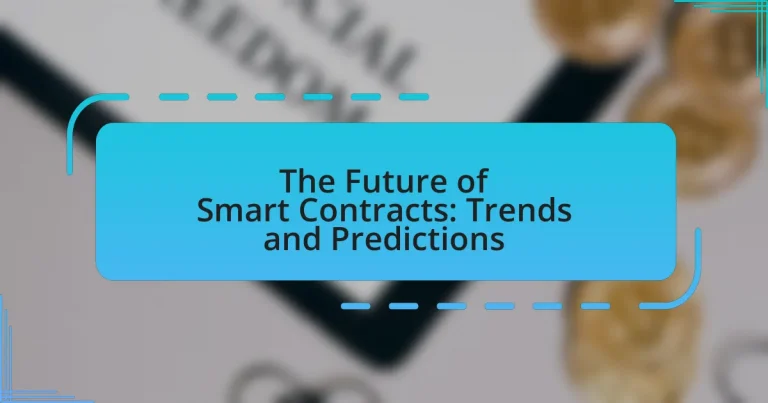Smart contracts are self-executing agreements with terms encoded directly into blockchain technology, facilitating automated and trustless transactions across various sectors. This article explores the significance of smart contracts for the future, highlighting their potential to enhance efficiency, reduce costs, and eliminate intermediaries in industries such as finance, real estate, and supply chain management. Key components, security measures, and trends shaping the evolution of smart contracts are discussed, alongside challenges related to legal enforceability and technological barriers. The article also examines the impact of decentralized finance and NFTs, as well as predictions for the future adoption and transformation of industries through smart contracts.
What are Smart Contracts and Why are They Important for the Future?
Smart contracts are self-executing contracts with the terms of the agreement directly written into code, enabling automated and trustless transactions on blockchain networks. Their importance for the future lies in their ability to enhance efficiency, reduce costs, and eliminate the need for intermediaries in various sectors, such as finance, real estate, and supply chain management. According to a report by the World Economic Forum, by 2025, 10% of global GDP could be stored on blockchain technology, highlighting the transformative potential of smart contracts in facilitating secure and transparent transactions.
How do Smart Contracts function in blockchain technology?
Smart contracts function in blockchain technology by executing predefined agreements automatically when specific conditions are met. These self-executing contracts are coded into the blockchain, ensuring that once deployed, they operate without the need for intermediaries, reducing the risk of manipulation or fraud. The Ethereum blockchain is a prominent example where smart contracts are utilized, allowing developers to create decentralized applications that can perform complex transactions securely and transparently. The immutability of blockchain ensures that once a smart contract is executed, its terms cannot be altered, providing a reliable framework for various applications, from financial services to supply chain management.
What are the key components of a Smart Contract?
The key components of a Smart Contract include code, conditions, and execution. The code defines the rules and logic of the contract, while the conditions specify the triggers that must be met for the contract to execute. Execution refers to the automatic enforcement of the contract terms once the conditions are satisfied. These components work together to ensure that transactions are carried out securely and transparently on a blockchain, eliminating the need for intermediaries.
How do Smart Contracts ensure security and trust?
Smart contracts ensure security and trust through their self-executing nature and the use of blockchain technology. By automating contract execution based on predefined conditions, smart contracts eliminate the need for intermediaries, reducing the risk of fraud and manipulation. The immutable nature of blockchain records ensures that once a contract is deployed, its terms cannot be altered, providing transparency and accountability. Additionally, cryptographic techniques secure the data within smart contracts, making unauthorized access or tampering extremely difficult. These features collectively foster a trustless environment where parties can engage in transactions with confidence, as evidenced by the increasing adoption of smart contracts in various industries, including finance and supply chain management.
What trends are shaping the future of Smart Contracts?
The future of smart contracts is being shaped by trends such as increased interoperability, enhanced security measures, and the integration of artificial intelligence. Interoperability allows different blockchain networks to communicate, facilitating the use of smart contracts across various platforms, which is essential for broader adoption. Enhanced security measures, including formal verification and advanced cryptographic techniques, are being developed to mitigate vulnerabilities and ensure the reliability of smart contracts. Additionally, the integration of artificial intelligence is enabling smart contracts to execute more complex agreements and automate decision-making processes, thereby increasing their efficiency and applicability in various sectors. These trends are supported by ongoing research and development in blockchain technology, as well as growing interest from industries seeking to leverage smart contracts for improved operational efficiency.
How is the adoption of blockchain technology influencing Smart Contracts?
The adoption of blockchain technology is significantly enhancing the functionality and reliability of Smart Contracts. By utilizing blockchain’s decentralized and immutable nature, Smart Contracts can execute transactions automatically without the need for intermediaries, thereby reducing costs and increasing efficiency. For instance, according to a report by Deloitte, the use of blockchain can streamline contract execution processes by up to 30%, demonstrating its impact on operational efficiency. Additionally, the transparency provided by blockchain ensures that all parties have access to the same information, which minimizes disputes and enhances trust among participants. This shift towards blockchain-based Smart Contracts is reshaping industries by enabling more secure and efficient contractual agreements.
What role do decentralized finance (DeFi) and NFTs play in Smart Contracts?
Decentralized finance (DeFi) and non-fungible tokens (NFTs) are integral to the functionality and application of smart contracts. DeFi utilizes smart contracts to automate financial transactions, enabling peer-to-peer lending, trading, and yield farming without intermediaries, which enhances efficiency and reduces costs. NFTs leverage smart contracts to establish ownership and provenance of unique digital assets, allowing for secure transactions and verifiable scarcity in the digital marketplace. The Ethereum blockchain, for example, supports both DeFi protocols and NFT standards like ERC-721, demonstrating how smart contracts facilitate diverse applications across these sectors.
What are the potential challenges facing Smart Contracts?
Potential challenges facing smart contracts include legal enforceability, security vulnerabilities, and scalability issues. Legal enforceability is a significant concern because many jurisdictions do not yet recognize smart contracts as legally binding, which can lead to disputes over contract validity. Security vulnerabilities arise from coding errors and bugs, as evidenced by incidents like the DAO hack in 2016, where a flaw in the smart contract code led to the loss of $60 million in Ether. Scalability issues are also prevalent, as blockchain networks can struggle to process a high volume of transactions quickly, impacting the efficiency of smart contracts in real-world applications.
How can legal and regulatory issues impact Smart Contracts?
Legal and regulatory issues can significantly impact smart contracts by determining their enforceability and compliance with existing laws. For instance, jurisdictions may have varying interpretations of contract law, which can affect how smart contracts are recognized in legal disputes. Additionally, regulations concerning data privacy, financial transactions, and consumer protection can impose restrictions on how smart contracts are designed and executed. A notable example is the European Union’s General Data Protection Regulation (GDPR), which mandates strict data handling practices that could conflict with the immutable nature of blockchain technology used in smart contracts. Thus, the legal landscape directly influences the development, adoption, and operational frameworks of smart contracts.
What are the current legal frameworks surrounding Smart Contracts?
The current legal frameworks surrounding smart contracts vary by jurisdiction but generally fall under existing contract law principles. In many countries, smart contracts are recognized as legally binding agreements if they meet the essential elements of a contract, such as offer, acceptance, and consideration. For instance, the Uniform Electronic Transactions Act (UETA) in the United States and the Electronic Identification and Trust Services Regulation (eIDAS) in the European Union provide a legal basis for electronic contracts, including smart contracts. Additionally, some jurisdictions, like Wyoming in the U.S., have enacted specific legislation that explicitly recognizes the validity of smart contracts and blockchain technology, further clarifying their legal status.
How can Smart Contracts adapt to evolving regulations?
Smart contracts can adapt to evolving regulations by incorporating flexible coding structures that allow for updates and modifications in response to legal changes. This adaptability is achieved through the use of modular programming, which enables developers to alter specific components of the smart contract without overhauling the entire system. Additionally, integrating oracles can facilitate real-time data feeds that reflect regulatory changes, ensuring compliance. For instance, projects like Chainlink provide decentralized oracles that can relay regulatory updates to smart contracts, allowing them to adjust automatically. This approach not only enhances compliance but also fosters trust among users by demonstrating responsiveness to legal frameworks.
What technological barriers exist for Smart Contracts?
Technological barriers for Smart Contracts include scalability issues, interoperability challenges, and security vulnerabilities. Scalability is a significant concern as many blockchain platforms struggle to handle a high volume of transactions efficiently, leading to delays and increased costs. Interoperability challenges arise because different blockchain networks often operate in silos, making it difficult for Smart Contracts to communicate across platforms. Security vulnerabilities are critical, as Smart Contracts can be susceptible to coding errors and exploits, which have led to significant financial losses in the past, such as the DAO hack in 2016 that resulted in the loss of $60 million worth of Ether.
How does scalability affect the implementation of Smart Contracts?
Scalability significantly impacts the implementation of smart contracts by determining the number of transactions that can be processed simultaneously on a blockchain network. High scalability allows for more transactions per second, which is crucial for the efficient execution of smart contracts, especially in applications requiring real-time processing, such as decentralized finance (DeFi) and supply chain management. For instance, Ethereum’s transition to a proof-of-stake consensus mechanism aims to enhance scalability, enabling the network to handle thousands of transactions per second compared to its previous capacity of around 15 transactions per second. This improvement directly influences the feasibility and performance of smart contracts, as increased scalability reduces latency and transaction costs, making them more practical for widespread use.
What are the security vulnerabilities associated with Smart Contracts?
Smart contracts are susceptible to several security vulnerabilities, including reentrancy attacks, integer overflow and underflow, and improper access control. Reentrancy attacks occur when a smart contract calls another contract and allows the called contract to make recursive calls back to the original contract before the first execution is complete, potentially draining funds. Integer overflow and underflow vulnerabilities arise when arithmetic operations exceed the maximum or minimum limits of data types, leading to unexpected behavior. Improper access control can allow unauthorized users to execute functions that should be restricted, compromising the contract’s integrity. These vulnerabilities have been highlighted in various incidents, such as the DAO hack in 2016, where a reentrancy attack led to the loss of $60 million in Ether, underscoring the critical need for robust security measures in smart contract development.
What predictions can be made about the future of Smart Contracts?
Predictions about the future of smart contracts indicate significant growth in their adoption across various industries. As blockchain technology matures, smart contracts are expected to enhance automation, reduce transaction costs, and improve security in sectors such as finance, supply chain, and real estate. According to a report by MarketsandMarkets, the smart contract market is projected to grow from $345 million in 2020 to $3.5 billion by 2026, reflecting a compound annual growth rate (CAGR) of 32.2%. This growth is driven by increasing demand for decentralized applications and the need for transparent and efficient contract execution. Additionally, advancements in interoperability between different blockchain platforms are likely to facilitate broader use cases for smart contracts, further solidifying their role in digital transactions.
How will Smart Contracts evolve in the next decade?
Smart contracts will evolve significantly in the next decade through increased interoperability, enhanced security features, and broader adoption across various industries. Interoperability will allow different blockchain networks to communicate seamlessly, enabling smart contracts to function across multiple platforms, which is essential for creating a cohesive ecosystem. Enhanced security features will emerge as developers focus on mitigating vulnerabilities, leading to more robust coding practices and the integration of formal verification methods to ensure contract integrity. Furthermore, as industries such as finance, supply chain, and healthcare recognize the efficiency and transparency offered by smart contracts, their adoption will accelerate, supported by regulatory frameworks that provide clarity and protection for users. This evolution is evidenced by the growing number of projects and partnerships aimed at integrating smart contracts into existing systems, indicating a strong trend towards mainstream utilization.
What innovations are expected to enhance Smart Contract functionality?
Innovations expected to enhance Smart Contract functionality include the integration of artificial intelligence, interoperability protocols, and advancements in blockchain scalability. Artificial intelligence can automate decision-making processes within smart contracts, allowing for more complex and adaptive agreements. Interoperability protocols enable different blockchain networks to communicate, facilitating the execution of smart contracts across various platforms. Additionally, improvements in blockchain scalability, such as sharding and layer-2 solutions, can significantly increase transaction speeds and reduce costs, making smart contracts more efficient and accessible. These innovations are supported by ongoing research and development in the blockchain space, indicating a strong trend towards more robust and versatile smart contract applications.
How might user adoption change in the coming years?
User adoption of smart contracts is expected to increase significantly in the coming years due to advancements in technology and growing awareness of their benefits. As blockchain technology matures and becomes more user-friendly, individuals and businesses will find it easier to integrate smart contracts into their operations. For instance, a report by Gartner predicts that by 2025, 70% of organizations will be using smart contracts, up from less than 10% in 2021. This shift will be driven by the increasing demand for automation, transparency, and efficiency in transactions, making smart contracts an attractive solution for various industries.
What industries are likely to be transformed by Smart Contracts?
Smart contracts are likely to transform industries such as finance, supply chain management, real estate, healthcare, and legal services. In finance, smart contracts can automate transactions and reduce the need for intermediaries, enhancing efficiency and security. In supply chain management, they enable real-time tracking and verification of goods, improving transparency and reducing fraud. The real estate sector benefits from streamlined property transactions and automated escrow services, while healthcare can leverage smart contracts for secure patient data sharing and automated insurance claims processing. Legal services can see a shift towards automated contract execution and dispute resolution, minimizing the need for traditional legal processes. These transformations are supported by the increasing adoption of blockchain technology, which underpins smart contracts, as evidenced by a report from Deloitte highlighting the potential for significant cost savings and efficiency gains across these sectors.
Which sectors are currently leading in Smart Contract adoption?
The sectors currently leading in Smart Contract adoption are finance, supply chain management, and healthcare. In finance, decentralized finance (DeFi) platforms utilize smart contracts for automated transactions and lending, significantly enhancing efficiency and transparency. Supply chain management benefits from smart contracts by enabling real-time tracking and verification of goods, which reduces fraud and improves accountability. In healthcare, smart contracts facilitate secure sharing of patient data and streamline processes such as insurance claims, thereby enhancing data integrity and operational efficiency. These sectors demonstrate the practical applications and advantages of smart contracts in real-world scenarios.
How can Smart Contracts improve efficiency in traditional industries?
Smart contracts can improve efficiency in traditional industries by automating processes and reducing the need for intermediaries. This automation streamlines operations, minimizes human error, and accelerates transaction times. For instance, in supply chain management, smart contracts can automatically execute payments and trigger actions based on predefined conditions, such as the delivery of goods, which enhances transparency and accountability. According to a report by the World Economic Forum, the implementation of blockchain technology, including smart contracts, could reduce operational costs by up to 30% in various sectors.
What best practices should be followed when implementing Smart Contracts?
When implementing Smart Contracts, best practices include thorough testing, code audits, and clear documentation. Thorough testing ensures that the contract behaves as expected under various conditions, reducing the risk of bugs or vulnerabilities. Code audits by experienced professionals help identify security flaws and optimize performance, as evidenced by the increased number of vulnerabilities discovered in unaudited contracts. Clear documentation facilitates understanding and maintenance, which is crucial for future updates and compliance. Following these practices significantly enhances the reliability and security of Smart Contracts in various applications.
How can organizations ensure the security of their Smart Contracts?
Organizations can ensure the security of their Smart Contracts by implementing rigorous testing and auditing processes. Conducting thorough code reviews and utilizing automated testing tools can identify vulnerabilities before deployment. Additionally, engaging third-party security firms for comprehensive audits provides an external perspective on potential risks. According to a report by ConsenSys, 70% of Smart Contracts contain vulnerabilities, highlighting the necessity of these security measures. Furthermore, adopting best practices such as using established frameworks and libraries can minimize the likelihood of errors in contract development.
What steps should be taken to educate stakeholders about Smart Contracts?
To educate stakeholders about Smart Contracts, organizations should implement a structured educational program that includes workshops, webinars, and informational resources. These initiatives should focus on explaining the fundamental concepts of Smart Contracts, their benefits, and real-world applications. For instance, providing case studies from industries that have successfully integrated Smart Contracts can illustrate their practical value. Additionally, stakeholders should be encouraged to participate in hands-on training sessions to enhance their understanding of the technology. Research indicates that 70% of organizations that invest in training see improved adoption rates of new technologies, highlighting the importance of education in facilitating stakeholder engagement with Smart Contracts.




